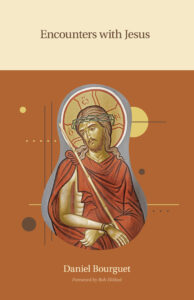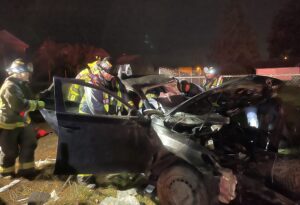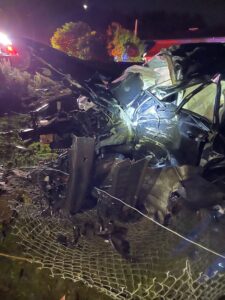|
Choosing the life-giving Gospel of Jesus Christ over false “Gospels” of death
![]() For followers of Jesus “the Gospel” is the life-giving message that God became human in his Son Jesus Christ, to seek out and save the lost, destroying the power of sin and death through dying by execution on the cross. Jesus is raised from the dead, empowering his disciples through the Holy Spirit to announce and embody his kingdom for the salvation of the world.
For followers of Jesus “the Gospel” is the life-giving message that God became human in his Son Jesus Christ, to seek out and save the lost, destroying the power of sin and death through dying by execution on the cross. Jesus is raised from the dead, empowering his disciples through the Holy Spirit to announce and embody his kingdom for the salvation of the world.
In diabolical contrast, the Israeli Defense Force has launched a intelligence-gathering system they call “Habsora” (“The Gospel” in Hebrew), that identifies human targets of interest in Gaza to kill, knowingly including Palestinian civilians, including women and children. Christians and others who support Israel’s war in Gaza are effectively aligning themselves with this anti-Gospel of death, which diametrically opposes God’s life-giving Gospel of Jesus Christ.
According to Yuval Abraham investigative report published November 30th in the Israeli media outlet +972 Magazine, “A mass assassination factory’: Inside Israel’s calculated bombing of Gaza” the “Gospel”:
“Is largely built on artificial intelligence and can “generate” targets almost automatically at a rate that far exceeds what was previously possible. This AI system, as described by a former intelligence officer, essentially facilitates a “mass assassination factory.”
According to MEM, Middle East Monitor’s December 1st article “Israel’s AI system for target selection [the Gospel] has generated ‘mass assassination factory’ in Gaza”:
“The Israeli army has files on the vast majority of potential targets in Gaza — including homes — which stipulate the number of civilians who are likely to be killed in an attack on a particular target, sources told +972. This number is calculated and known in advance, and the army’s intelligence units also know shortly before carrying out an attack roughly how many civilians are certain to be killed.”
“Highlighting the shocking disregard for civilian life, the report found that the Israeli military command knowingly approved the killing of hundreds of Palestinian civilians in an attempt to assassinate a single top Hamas military commander. “The numbers increased from dozens of civilian deaths [permitted] as collateral damage as part of an attack on a senior official in previous operations, to hundreds of civilian deaths as collateral damage,” one source told +972.”
In light vs. dark contrast, “Jesus was going throughout all Galilee, teaching in their synagogues and proclaiming the gospel of the kingdom, and healing every kind of disease and every kind of sickness among the people” (Mt 9:35).
Jesus’ presence as God’s Son and Israel’s Messiah were identified as being “full of grace and truth” (Jn 1:14). He came to “seek and save that which is lost” (Lk 19:10), and “save people’s lives and not destroy them” (Lk 9:56).
Jesus sends John the Baptist’s disciples back to John to report that his actions are in alignment with signs of Israel’s expected Messiah in Isaiah 35:5-6 and Isaiah 61:1.
“The blind receive sight and the lame walk, the lepers are cleansed and the deaf hear, the dead are raised up, and the poor have the Gospel preached to them” (Mt 11:5).
As followers of Jesus committed to proclaiming and embodying the Gospel, we must refuse aligning ourselves with any nation (Israel and our own countries included) that engages in the killing of human beings, regardless of official justifications. May we prayerfully work to expose and repent of any agreements we have with the powers of death, fully embracing the life-giving power of God, as Paul states clearly in Romans 1:16.
“For I am not ashamed of the Gospel, for it is the power of God for salvation to everyone who believes, to the Jew first and also to the Greek.”
Click here to order a copy Guerrilla Gospel. on my weekly podcast “Disciple: Word, Spirit, Justice, Witness” on Spotify or Apple).
Following Jesus, our commander in chief
 My recent interactions with persecuted Christians in in the underground church in Iran have got me thinking afresh about Jesus’ outsider, subversive, ‘behind enemy lines’ status. In these days when some calling themselves Christians seek political power and control, we must lean into our stranger and alien status, seeking understanding as to what it means to follow Jesus as the Messiah, and enter his kingdom “not of this world.”
My recent interactions with persecuted Christians in in the underground church in Iran have got me thinking afresh about Jesus’ outsider, subversive, ‘behind enemy lines’ status. In these days when some calling themselves Christians seek political power and control, we must lean into our stranger and alien status, seeking understanding as to what it means to follow Jesus as the Messiah, and enter his kingdom “not of this world.”
Last week I met with ten Iranians via Zoom, who asked me to take them through Guerrilla Gospel– which my Persian-speaking interpreter communicated as we worked through through the following excerpt from the Preface and Chapter One before doing some other Bible studies.
“Jesus of Nazareth is my inspiration for life and ministry, and what I call “Bible studies” or “guerrilla gospel encounters.” Through his life and teaching recorded in the Gospels of the New Testament, he defines the word gospel, which means good news or liberating message. According to New Testament Scriptures, Jesus is God’s Son, Israel’s Messiah, and the Lord himself in the flesh. He was born into a world marked by oppression and injustice to announce and embody God’s global liberation movement. Like an insurgent, Jesus comes in under the radar, behind enemy lines, and then builds a foundation of trust with a growing entourage of humble followers. He resists the authorities of his day, along with their legal systems, and he calls others to join him.
Jesus incites a revolution that he calls the Kingdom of God. He starts out incognito, but after his baptism at age thirty, he publicly demonstrates an unprecedented authority in his teaching, which is backed up by acts of healing, advocacy, and liberation on behalf of the oppressed, poor, or disenfranchised. In Jesus’ many encounters in the Gospels, he breaks the established rules to advocate for the marginalized. He confronts the powers—both visible and invisible, modeling a holistic spiritual warfare that brings freedom.
I am compelled by the way he loves people so freely and effectively wherever he goes, seeking and finding the lost and forsaken, raising up the downtrodden and hopeless, offering abundant life to all who will follow him. Reading about Jesus in the Gospels inspires me to follow him, to go deep with him, to tune into his instructions in my daily life, and to work with him to reach others with the good news he embodies and proclaims throughout the New Testament.
Following Comandante Jesús
I joke with former gang members involved in Tierra Nueva’s ministry about how Jesus is our comandante, which is Spanish for military or guerrilla commander. He’s the one who calls the shots, instructing soldier disciples in the trenches of warfare to advance the movement as an unprecedented and truly life-giving insurgency, to win over inhabitants, neighborhoods and people groups of the world for the kingdom of God. These friends are used to gang shot-callers or are themselves shot-callers. But they are tired of living in fear, grieving beloved homies killed in drive-by shootings, and spending years of their lives serving long prison sentences. We love that Jesus is an outsider, on the hunt for recruits, eager to go out on missions. We love that he gathers with his confidants in the mountains or in boats, on foot or on the move from town-to-town, stopping along roadsides, visiting people in homes, teaching and healing crowds along the way in fields or synagogues, on beaches or in the wilderness.
Talking like this about Jesus gets us excited. We’ve all seen too many casualties of the fast life of both legal and illegal workaholism, drugs, alcohol, and poverty, gang violence and domestic violence. We’ve had enough of relationship breakdown, children taken by Child Protective Services, incarceration, premature death by suicide, homicide, overdose, and different illnesses. Many of us know firsthand the life-restoring bene- fits of Jesus’ saving help and want to see others benefit too. Being part of a movement of true liberation compels us, giving us a new reason to live— and perhaps even something to die for.
The dictionary definition for “guerrilla” works to a certain extent to describe Jesus and his followers, past and present: “a member of a band of irregular soldiers that uses guerrilla warfare, harassing the enemy by surprise raids, sabotaging communication and supply lines.” In Spanish, guerrilla is the diminutive for guerra (war), which includes the notion of small-scale war. Guerrilla warfare is defined as “the use of hit-and- run tactics by small, mobile groups of irregular forces operating in terri- tory controlled by a hostile, regular force.” The ministry of Jesus is all about reaching and empowering ordinary people and usually involves prolonged struggle against formidable powers. It requires flexibility, adaptability, and being on-point around the clock.
Unlike modern guerrilla warfare, Jesus refuses physical violence, coercion, and terror (Mt 26:52; Lk 9:55). But like guerrilla activity, Jesus uses unconventional tactics, travels in small, mobile bands (Mk 9:30), recruits from among the outcasts (Mk 2:15), advocates for the oppressed (Lk 13:16), depends on local collaborators for support (Lk 8:3; Jn 12:1-2), and multiplies his followers and thereby his fighting force (Lk 10:1).’
There’s a subversive dimension of Jesus’ presence as God infiltrates the human race. God’s strategy is to be born undercover, behind enemy lines, into a family that is both humble and yet has ties to the people’s hero, King David. Jesus, though, takes the revolution to a new level. Jesus’ first thirty years as a carpenter in Nazareth reveal how keen God is about sleeper-cell beginnings as a way to imbed his yeast-like realm outside the radar of empire. Once activated at his baptism, Jesus embodies an unprecedented authority that attracts adherents, and the movement multiplies amongst the disenfranchised.
Jesus’ main way of operating is to meet up with people wherever he finds them. He is not a commander who runs things from a safe distance, but an on-the-ground, front-line activist. He often takes the initiative, going after people personally. He sees and calls ordinary people—fish- ermen (Mt 4:18–22) and tax collectors (Mt 9:9), including the chief tax-collector, Zaccheus, whom he calls down from a tree, and then invites himself to his house for a stay (Lk 19:1–10). Jesus sees a man paralyzed for thirty-eight years among invalids at a sheep gate, asks him if he wants to be well, and then heals him on the spot (Jn 5:2–9). Jesus also attracts adherents from among more privileged sectors: the Pharisee leader, Nicodemus, who is impressed by his signs (Jn 3:1–2); Joanna, the wife of Herod’s steward, Chuza who supports Jesus and the disciples financially; (Lk 8:3) a synagogue official who is desperate to see his dying daughter healed (Lk 8:41); a Roman centurion who begs Jesus to heal his slave (Mt 8:5–9). Are you ready to join up?
Other times, Jesus’ encounters are a bit on the fly, unplanned meetings that seem to be interruptions. Blind people and lepers cry to him for mercy from the roadsides, and he stops to heal or cleanse, teaching as he goes (see Lk 18:35–43; Mk 10:46–52; Mt 8:1–3). People also come to Jesus with the need for deliverance (e.g., Mt 8:16, 9:32–33; Mk 5:2–16). In every case, these encounters become opportunities for Jesus to teach, challenge, and offer immediate relief. In one instance, men cut a hole in the roof and lower a paralyzed man down in front of Jesus and some antagonistic religious leaders, and Jesus spontaneously declares to the paralytic, “your sins are forgiven” (Mk 2:2–7). Then Jesus proves his authority by telling the man to “rise, take up your pallet and go home” (Mk 2:8–11). Such actions inspire discussion and sometimes aggression from Jesus’ enemies.
Jesus often uses the language of guerrilla warfare in his instructions to his disciples, and there’s a combativeness to his words and actions throughout the Gospels. “Behold, I have given you authority to tread on serpents and scorpions, and over all the power of the enemy, and nothing will injure you,” Jesus instructs seventy of his fresh recruits (Lk 10:19). He also proclaims violence against unseen enemies: “The Son of God appeared for this purpose, to destroy the works of the devil” (1 Jn 3:8). Since “the whole world lies in the power of the evil one,” Jesus and his disciples must organize a strike force and be adequately equipped for the task (1 Jn 5:18).
Jesus also uses kingdom tactics and an arsenal of weapons that are “not of this world” (Jn 18:36), such as prayer, fasting, forgiveness, love, and the power of God. His armory also includes words, which he and his disciples wield as an integral part of their mission to announce the good news to all of creation (Mk 16:15). Jesus himself says: “Do not think that I came to bring peace on the earth; I did not come to bring peace, but a sword” (Mt 10:34). This sword is elsewhere called “the sword of the Spirit” and is equated with the Word of God (Eph 6:17) as part of the believers’ arsenal (Eph 6:13-17). Hebrews 4:12 states this clearly: “For the word of God is living and active and sharper than any two-edged sword.” Jesus even drives out evil spirits with a word (Mt 8:16).
Jesus’ ministry of the Word includes teaching, preaching, healing, deliverance, and prophecy. Jesus commands his disciples: “Preach, saying, ‘The kingdom of heaven is at hand.’ Heal the sick, raise the dead, cleanse the lepers, cast out demons. Freely you received, freely give” (Mt 10:7–8). All these actions and others too are part of Jesus’ weaponry. Physical violence is never included in Jesus’ tactics—but rather active enemy love. This love includes the resistance of evil and injustice through exposure and verbal confrontation as well as public non-compliance with unjust laws.
Throughout Jesus’ earthly ministry, he is neither a religious nor social insider, but operates outside the circles of Jewish religious organizations and certainly of the Roman Empire. He does not enjoy elevated status within a religion collaborating with the powers, nor is he an accepted leader by the dominant culture. Rather, he lives outside an overarch- ing theocracy, and the kingdom he proclaims is decidedly “not of this world” (Jn 18:36). In fact, in a subversive analogy he compares himself to a thief who comes to burglarize a house (Mt 24:43; Lk 12:39), first tying up the strong man before robbing his goods (Mt 12:29; Mk 3:27). This imagery suggests that the world is like a prison, which implies that Jesus’ mission—and therefore ours—is to engage in prison breaks that will liberate captives rather than reform and take over the prison! Jesus even commissions Peter as head of a movement called church to storm the gates of hell to free captives (Mt 16:18).
Unlike contemporary religions and political ideologies that seek to increase control and domination, Jesus doesn’t call his followers to take up arms in a combatant way to prevent or defend against the kingdoms of this world (Mt 20:25-26). In fact, Jesus rebukes his disciples for trying to defend him with weapons, saying: “Do you think that I cannot appeal to my Father, and he will at once put at my disposal more than twelve legions of angels?” (Mt 26:53).
Jesus describes himself as “from above” (Jn 3:31) in contrast to every- one else “from below,” (Jn 8:23) and tells his contemporaries that he will soon leave to a place where they can’t find him (Jn 7:34–36). From his rightful place in this kingdom, he informs us of heaven’s priorities so that we can embody his “on earth as in heaven” agenda (Mt 6:10). Today, in our increasingly post-Christendom world, we must deliberately own our “aliens and strangers” status (1 Pt 1:1, 2:11) by fully embracing our heavenly “no longer strangers and aliens” identity (Eph 2:19). As you follow Jesus, an identity shift happens that will put you at odds with the culture and dominant values around you, leading others to possibly view you as a kind of resister. Jesus describes himself as one who is rejected (Jn 12:48), hated (Jn 7:7, 15:18, 23, 24, 25), and persecuted (Jn 15:20). He promises his followers that they will experience these things as well,4 as he includes them as “not of the world” (Jn 17:14).
In contrast to guerrilla combatants who operate in secrecy, sneaking around the powerful state, Jesus mostly speaks and acts openly in public settings. He teaches in synagogues and in the Jerusalem temple, over- turning the tables of money-changers and directly confronting religious leaders (Mt 21:12-13). “I have spoken openly to the world; I always taught in synagogues and in the temple, where all the Jews come together; and I spoke nothing in secret,” Jesus tells Pilate (Jn 18:20). Jesus considers the temple his Father’s house (Lk 2:49) and recognizes that “the earth is the Lord’s” (Ps 24:1). Yet when Jewish leaders plot Jesus’ death, he stops moving about in Judea and limits his walking to Galilee (Jn 7:1). When temple leaders in Jerusalem pick up stones to throw at Jesus, he hides himself (Jn 8:59). When they try to seize him, he eludes “their grasp” (Jn 10:39). When Jewish authorities begin planning together to kill him, “he no longer” continues “to walk publicly,” but goes “away from there to the country near the wilderness” (Jn 11:54). The fact that chief priests and Pharisees order the people to inform them about Jesus’ whereabouts in order to arrest him marks Jesus as a subversive troublemaker who must take precautions (see Jn 11:57). So does the fact that he is eventually crucified between two criminals (Lk 23:32).
Jesus’ public ministry only lasts three years before he is arrested and executed as a law-breaker by crucifixion. In that short time, Jesus focuses on living out his Father’s mission. He recruits twelve disciples, who travel with him everywhere, receiving his teaching and witnessing his direct action. Eleven of these disciples are among the 120 who receive the Holy Spirit at Pentecost. Jesus’ explosive life inspires a movement of followers, who—after being empowered by the Holy Spirit at Pentecost—continue to embody and proclaim the kingdom of God.
The life and teachings of Jesus fulfill God’s historic mission to save the world and set the bar for action until he returns. Jesus’ many encounters with people are written up in the New Testament Scriptures to be read and discussed today, inviting and inspiring us towards Christ-like action. Our task is to figure out how we can transmit his rich teaching in similar places on behalf of similar beneficiaries—how we can “get away with a Bible study,” as I’m fond of saying—or with a guerrilla gospel encounter.
Spirit at Work: Healing, Empowerment, Revelation, Salvation
 As we seek to share the liberating message of Jesus through personal visits, ministry on the street, Bible studies and teaching we’ve come to recognize over and over that it’s not about transmitting knowledge so people can amass facts about God, Jesus, and the Bible. We all need the living Word to pierce our hearts, making it through our indifference, negative expectations, and defenses. This is the work of the Holy Spirit, who reveals, reminds us, and others of Jesus’ teaching, pointing us in the right direction as we call, visit, approach people, and write articles and books.
As we seek to share the liberating message of Jesus through personal visits, ministry on the street, Bible studies and teaching we’ve come to recognize over and over that it’s not about transmitting knowledge so people can amass facts about God, Jesus, and the Bible. We all need the living Word to pierce our hearts, making it through our indifference, negative expectations, and defenses. This is the work of the Holy Spirit, who reveals, reminds us, and others of Jesus’ teaching, pointing us in the right direction as we call, visit, approach people, and write articles and books.
Jesus recognized that his own example and teaching were not enough for his disciples to bear witness, continuing his movement after his death, resurrection, and ascension.
“I am sending forth the promise of my Father upon you; but you are to stay in the city until you are clothed with power from on high” (Lk 24:49).
Once they’d received the empowerment of the Spirit at Pentecost, they stepped into their spiritual authority and were led by the Spirit to exercise gifts of the Spirit like healing the sick, receiving inspired revelation, prophesying, discerning, and casting out evil spirits…
The last verse of Mark’s Gospel states clearly what we need and expect. “And they went out and preached everywhere, while the Lord worked with them, and confirmed the word by the signs that followed” (Mk 16:20).
We pray regularly for physical healing at our Tierra Nueva Bible studies, street outreach and Sunday worship, and often hear that it happens.
Last week Mike, a strong, 61-year-old truck driving instructor told us how he’d been living with pain in his right shoulder that was worsening, making it hard to shift gears as he drove trucks and trained drivers. He shared how he’s always been wired outwards, thinking of how he can help people, and has struggled to receive for himself. Since he’d lost his health insurance after being unemployed and didn’t yet qualify for the health plan in his new job, he decided a few weeks back to do something he’d never done—to ask Jesus to heal him! After asking for healing for his right shoulder he said he slept like a baby, awaking to complete freedom from pain, which is gone for good.
While teaching Iranian underground church leaders in Armenia in mid-October, many received healing and were filled with the Holy Spirit in ways that brought refreshment and empowerment for ministry.
We often experience being guided by the Spirit as we seek out people on the streets. Last Friday night we were having trouble locating anyone as the police had been driving people away from the usual places where people gather. When we finally began finding people and served them hot drinks, I was offering to pray for people if they had any particular needs. Nearly everyone was responding: “No thanks. I’m good.”
After hearing these responses and knowing people were in dire need, I suddenly received what I think was an inspired word, which I shared with a group of younger men and women who were inhaling fentanyl smoke from foil they were heating up before me beside the dumpsters of a big box store.
“Actually, you don’t need me to pray for you. You can pray to God directly yourselves,” I said, “There are no barriers between you and God. God loves you just the way you are and wants to help you. There are no hoops you have to jump through, nothing you have to do to qualify. Jesus showed us this when he walked the earth, by freely caring for and openly loving those society excluded, and he’s still alive to help us now.”
A young woman looked up startled from her smoking foil and said “that’s exactly what my mother says. She’s a Lutheran pastor.” Another woman looked up, tears welling up in her eyes. It seemed the Spirit enabled the Word to reach people’s heart. This inspires us to keep watching and expecting the Spirit’s guidance and direct action, which brings the Kingdom of God to the streets.
A woman who attends Tierra Nueva named Kristen (pictured above with her husband Eliazar) and her brother Gavin were miraculously spared from death when their car was hit by a speeding Amtrak train late one night (photos of car below). While she broke her back and Gavin was in critical care for over a month, both are recovering speedily as a result of prayer (listen to her testimony “Hit by a train but saved by Jesus” on my weekly podcast “Disciple: Word, Spirit, Justice, Witness” on Spotify or Apple).
Can War Be Just? – By Aaron White
 I don’t think I have to convince anyone that war is evil. We all know that it is.
I don’t think I have to convince anyone that war is evil. We all know that it is.
Here are the statistics for three ongoing wars, as of Nov 18, 2023:
Stats:
- Russo-Ukraine War: since 2014, 514,000 deaths, most of those in the past year since the Russian invasion.
- Israel-Palestine War: 40 consecutive days of fighting; 1400 Israelis killed and 240 hostages in the Hamas attack on Oct 7; more than 11,000 Palestians killed, two-thirds of whom are women and children; 2700 missing. Hospitals have been destroyed. Refugee camps bombed. Homes, churches, and the entire infrastructure of an already desperately poor area have been wiped out.
- Yemen Civil War: UN estimates over 377,000 killed by the end of 2021, more than half of those because of humanitarian crisis as a result of the war – displacement, starvation (more than half the population facing starvation), disease. 4 million people displaced from their homes in Yemen.
- 108.4 million forcibly displaced peoples, as of the end of 2022. Primary cause is war.
- One of the main results of displacement is that children become more and more vulnerable to sexual exploitation, slavery, and being turned into child soldiers. Since 2005 there are a verified 105,000 children who have been recruited and used as child soldiers – a uniquely horrific aspect of modern war. Children are seen as a cheap, dispensable, effective weapon of terror (See Romeo Dallaire, They Fight Like Soldiers, They Die Like Children).
War is evil. But is war a necessary evil? Is it sometimes required? Could it even be just?
I took a military history degree at the University of Victoria to try to understand something I believed I would never experience personally: war and killing. I discovered that Christians throughout the last two millennia have gone to great lengths to explain war and to justify its continued use as an instrument of the state. St. Augustine, who had first-hand experience in a city under siege, wrote The City of God in the 5th century. In it he gave a series of justifications for when, why and how Christians should fight and kill. Erasmus of Rotterdam, the 16th century Christian Humanist, made a strong argument that Christian nations should never go to war against each other, but allowed that it was still acceptable for Christians to fight in self-defence, as a last resort, and against Muslims. Hugo Grotius in the 17th century developed a theory of Natural Law that put limits and rules on warfare, but still assumed that Christian nations would always find the need to go to war. Carl von Clausewitz in 19th century Prussia developed a doctrine of Absolute War, where the entire might of the State – military, political, economic, social, and spiritual – should be employed to effect the entire destruction of one’s enemy. This demonic doctrine was adopted by the European military thinkers in advance of WW1 and WW2.
At the Second Vatican Council (1962-1965) an attempt was made to propose that warfare as a tool of the state – in particular unlimited, nuclear warfare – was immoral. The proposal was severely watered down in order to continue to allow states to engage in war when they found it necessary.
Even now with wars raging around the world, and some of the major participatory countries being led by professing Christians, we face the debate: is it ok – even necessary, even just and right – for Christians to fight and kill in war?
In the past the responsibility for deciding whether or not a war was just lay with the “prince” – the sovereign of the nation. The prince would bear the moral responsibility of the war, and therefore an ordinary Christian soldier could presumably engage in warfare without worrying if he was sinning, so long as his conduct within the war met certain standards. We do not have that moral luxury now (and it is questionable whether anyone really had that moral freedom). In a democracy we must bear responsibility for the leaders we choose and the actions that our nation takes.
So how can we decide if a war is just, or if any war can be just? Five to Seven principles were traditionally evaluated for the determination of whether a war was “just” or not: Just Cause; Right Intent; Net Benefit; Legitimate Authority; Last Resort; Proportionality of Means; and Right Conduct. Traditionally a war must meet certain requirements to be considered just. Two of the most important of these requirements are the separation of combatants and non-combatants; and ensuring that any military response is both appropriate and limited.
There is now no clear distinction between combatants and non-combatants. Wars are very infrequently fought in our age between two armies in a field. More often it is trained soldier versus unofficial insurgent (or revolutionary/freedom fighter), or even civilian against civilian. Those who deal in terror see civilians as primary targets. National militaries say they are able to avoid bombing hospitals and schools (though evidence proves otherwise); but sometimes nation-states don’t even try. It is hard to forget the infamous saying that came out of the Vietnam War: “It became necessary to destroy the town to save it.”
And when biological, chemical, nuclear weapons or other weapons of mass destruction are used or threatened, there are no civilians or combatants, only victims. The notion of appropriate and limited response is likewise obliterated. The Old Testament principle was eye for an eye, tooth for a tooth (Lev 24-19-21). This was a limitation on retaliation. If someone knocked out your tooth, you were not allowed to kill him or her in revenge. You could only take their tooth/the monetary value of a tooth, which was carefully regulated. This is the basis behind appropriate and limited responses. It is not considered “just” to kill 10,000 people if your enemy has killed 100 of your people. Of course, modern weapons take us into the possibility of indiscriminately killing millions at a time, of destroying entire cities through bombardment, even of the elimination of all human life from the planet. We really have moved beyond the realm of measured responses.
But even this, which should make modern war unjust by biblical and even secular standards, is not the real issue for Christians. Jesus took us away from the “eye for an eye” formula. He took us to radical forgiveness and love. “You have heard that it was said, ‘Eye for eye, and tooth for tooth.’ But I tell you, do not resist an evil person. If anyone slaps you on the right cheek, turn to them the other cheek also….You have heard that it was said, ‘Love your neighbour and hate your enemy. ‘ But I tell you, love your enemies and pray for those who persecute you, that you may be children of your Father in heaven.” (Matthew 5:38-45)
This is not woke idealism, not armchair social media virtue signalling. Jesus lived in Judea under the thumb of an oppressive Roman regime that regularly crucified thousands of people to quell rebellion. His family were displaced, twice, by state control and violence at his birth. They were refugees to Egypt. He healed a Roman centurion’s servant, and also one of the guards who came to arrest him. As he healed the man he said “Enough of this!” to his disciples (Luke 22:51). In Matthew’s Gospel he said, “Put your sword back into its place; for all those who take up the sword shall perish by the sword” (Mt 26:52).
Canadian songwriter Leonard Cohen looked at the example of Jesus, and the state of the world, and wrote the line, “Give me Christ or give me Hiroshima.”
Which then do we choose, as Christians? Christ, or Hiroshima? How do we justify taking a human life, a life for which Jesus died, even if we categorise that person as an enemy? We know that we have responsibilities as Christians to care for the poor, the orphan, the widow, the stranger, the sick, the imprisoned – we know this because we have been commanded by Jesus. But we have also been given clear instructions from Jesus, and from New Testament letters, about our responsibilities towards our enemies:
“Let love be genuine; hate what is evil, hold fast to what is good; love one another with mutual affection; outdo one another in showing honour. Do not lag in zeal, be ardent in spirit, serve the Lord. Rejoice in hope, be patient in suffering, persevere in prayer. Contribute to the needs of the saints; extend hospitality to strangers.
Bless those who persecute you; bless and do not curse them. Rejoice with those who rejoice, weep with those who weep. Live in harmony with one another; do not be haughty, but associate with the lowly; do not claim to be wiser than you are. Do not repay anyone evil for evil, but take thought for what is noble in the sight of all. If it is possible, so far as it depends on you, live peaceably with all. Beloved, never avenge yourselves, but leave room for the wrath of God; for it is written, ‘Vengeance is mine, I will repay, says the Lord.’ No, ‘if your enemies are hungry, feed them; if they are thirsty, give them something to drink; for by doing this you will heap burning coals on their heads.’ Do not be overcome by evil, but overcome evil with good.” Romans 12:9-21
With these direct commands from our Lord, and from Scripture, why have we tried so hard to justify this killing? Why have we spent so much mental energy attempting to prove why it is acceptable to destroy the life God created, and for whom Jesus died?
For many of us this question only really presents itself in theory: what would I do if? It is easy enough to talk about non-violence when no one is threatening the things you hold dear, quite another to refrain from violence when the threat is in your home. Strong arguments are made on behalf of self-defence, or better still, defending the innocent from aggression. Do I understand the anger and desire for vengeance of those Israeli families who lost loved ones in the attacks by Hamas? Of course. Do I understand the anger and desire for vengeance of those Palestinian families who have lost loved ones in the violence and oppression they have endured since 1948? Of course. Does this justify the taking of lives, including the indiscriminate taking of lives? Because make no mistake, when war happens, it is always the poor and the vulnerable who suffer the most.
But can we remove ourselves from this moral conundrum by saying that we aren’t the ones doing the killing or hurting the vulnerable? Well, we actually aren’t as removed from the situation as we think. War profiteering: making profits off of war, the creation and sale of death-dealing weapons.
Bob Ekblad has highlighted the following with regards to American war-profiteering: Congress recently approved 14 billion for arms to Israel, 61 billion arms to Ukraine. This has been portrayed as a generous support for US allies, but who is actually getting that money? US weapons manufacturing companies. The fact that American taxpayers are directly subsidising US companies like Lockheed Martin, Northrup Grumman, Raytheon, and General Dynamics make ordinary citizens direct participants in and beneficiaries of the killing and destruction. The stock prices for major weapons manufacturers in the defense sector have increased significantly since Hamas’ terrorist attack against Israel on October 7, and Israel’s subsequent bombing campaign and invasion of Gaza, as stated by Bryan Quinn in the special report on October 26, “The business of war: How arms industry profits from violent conflicts.”
“Morgan Stanley and TD Bank hope for aerospace and weapons boon after a 7% value increase from start of Israel-Hamas conflict,” writes Eli Clifton in his article “Hamas has created additional demand’: Wall Street eyes big profits from war.”
So, the poor are destroyed and the wealthy – particularly those concerned with the manufacture of weapons – get profoundly wealthier. But is this just happening in America? Canadian arms manufacturers exported an estimated 1 billion worth of weapons in 2022. The Canadian government approved 33 million dollars towards missiles in the Ukraine. Over 21 million dollars in military goods were sold to Israel in 2022. In 2015 a 15 billion dollar deal was struck to send military equipment to Saudi Arabia, weapons which have been used in the civil war in Yemen.
Then there is the matter of United Nations voting. On Oct 28 there was an emergency UN Vote which called for an “immediate, durable and sustained humanitarian truce” in Gaza. “Many considered the resolution to be the last opportunity to prevent the bloody and devastating ground assault that was subsequently launched on Gaza by Israel. The resolution was sponsored by Jordan and passed with 120 votes in favour, 14 against and 45 abstentions. In addition to calling for a truce, it also called for all parties to respect international humanitarian law and allow the “continuous, sufficient and unhindered” provision of humanitarian aid into Gaza. The resolution also called for the “immediate and unconditional release” of all civilians held captive” (“Canada Fails Humanity With Abstention on UN Vote,” https://www.cjpme.org/pr_2023_10_28_unga).
Canada abstained from this vote.
On Nov 15 PM Justin Trudeau, evoking some of the ideas of Just War theory, said, “Even wars have rules. All innocent life is equal in worth. Israeli and Palestinian.” Trudeau asked for “maximum restraint” from Israel, but did not call for a ceasefire. Nations are wary about demanding ceasefires from other nations, because they can’t risk their own sovereignty – their own political right to defend their borders and interests, to retaliate, to wage war.
However, I want to reiterate that for Christians, our primary engagement with this issue must not be political. We do not put our ultimate trust in nations, in the UN, in militaries. Psalm 20:7 – some trust in chariots some in horses but we depend on the Lord our God.
No, these horrific situations of war, and the seeming inability or lack of interest in the world to prevent them, should starkly remind us that there is a deeper reality. This is what the word Apocalypse means – to see behind the veil. There is an enemy of humanity, the thief who wants to steal, kill and destroy. War-making and war-profiteering and the destruction of the poor, the vulnerable, the innocent, the children, are all done in allegiance with this enemy. We are called to see this deeper reality, this spiritual truth. We are called to commit our lives not to the worldly appearance of truth, but to this deeper spiritual truth, revealed to us by the Spirit of God, in and about Christ Jesus. We are invited into the life of Jesus, the one who took in the sword rather than take up the sword. We are called to be utterly different. And the tragic reality is that Christians in this world, by and large, have not been very different at all. They have instead been some of the loudest in the support and justification of violence and war.
The way of Jesus is difficult, and might even appear impractical or impossible. But this does not excuse us from trying to live it, if this is what Jesus has called us to. And I believe it is.
Jesus calls us to a place of no rights, no retaliation, and no security except what he gives us. His teaching on revenge and suffering and the example he gives of self-sacrifice are clear, though they do not say what we want to hear. Justice will be done, and aggressors will be held accountable, but we must trust that this final judgement will be in the hands of the Lord. Whenever we try to execute that kind of judgement, too much that is good is destroyed along with the bad – just as Jesus explained in the Parable of the Wheat and Weeds (Matthew 13:24-30).
Here is Jacques Ellul, a man who lived through the Second World War, on the illusory danger of the Christian championship of violence:
“If I think that I cannot reach others except by participating in their revolt, their anger and hatred; if I think that Christ’s consolation is a deluding lie and reconciliation a hypocrisy, then I no longer believe that the coming kingdom is truly present, and I no longer believe in the Resurrection. And because in the depths of my heart I no longer believe these things, I substitute for the Resurrection my mythological picture of it, and I decide that I should have to build the kingdom on earth with my own hands. This unbelief is the truth of Christian championship of violence. All the rest is illusion.” – Jacques Ellul
Let us pray and live that we do not carry on in this illusion, which is the championship of violence.
Challenging War Profiteering with Jesus’ Prophetic Alternative
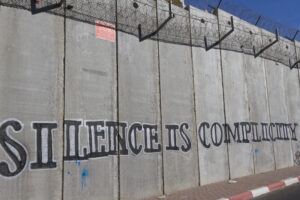 When Hamas militants massacred 1200 people inside Israel and carried 240 hostages into Gaza on October 7, they succeeded in provoking the State of Israel to unleash its wrath on Palestinians living in Gaza. The Palestinian death toll of largely civilians and children is rising daily—now nearly twelve times more than the original 1200 victims. Weapons manufacturers, the oil industry and larger economy are profiting from this war.
When Hamas militants massacred 1200 people inside Israel and carried 240 hostages into Gaza on October 7, they succeeded in provoking the State of Israel to unleash its wrath on Palestinians living in Gaza. The Palestinian death toll of largely civilians and children is rising daily—now nearly twelve times more than the original 1200 victims. Weapons manufacturers, the oil industry and larger economy are profiting from this war.
How might followers of Jesus challenge these injustices and offer life-giving alternatives in the face of increasing death and destruction?
The Israeli Defense Forces are responsible for the death of over 15,000 Gaza residents, 40% of whom are children— now some 160 kids a day! See Chris Hedges recent report here. In addition, Israeli bombs are destroying residences, hospitals, businesses, and the entire infrastructure, displacing hundreds of thousands of civilians, with no end in sight.
The United States is backing Israel 100%, providing billions of dollars in military assistance. President Joe Biden got Congress to approve $14 billion for weapons for Israel, and another $61 billion for Ukraine. This is enriching the American defense industry, adding to their already gluttonous profits from the war in Ukraine. The fact that American taxpayers are directly subsidizing US companies like Lockheed Martin, Northrup Grumman, Raytheon, General Dynamics and Elbit Systems make ordinary citizens direct participants in and beneficiaries of the killing and destruction.
These companies produce implements of death, such as tanks, artillery ammunition, precision-guided munitions, small diameter bombs, ammunition, Iron Dome interceptors, Hellfire missiles, drones…
Looking at the websites of RTX, Lockheed Martin, and General Dynamics you see nice faces, official commitments to Diversity, Equity, and Inclusion and human rights. But it’s all a façade as what these companies produce brings horrific suffering and death.
The death toll in Gaza is rapidly rising, provoking reactions from other militant groups in solidarity with Palestinians, causing Arab nations to rally together against Israel, increasing the likelihood of a regional war.
Isaiah’s prophets foretell the coming of God himself and the Messiah, who will destroy weapons of war directly.
“And he will judge between the nations, and will render decisions for many peoples; and they will hammer their swords into plowshares and their spears into pruning hooks. Nation will not lift up sword against nation, and never again will they learn war” (Is 2:4).
“For you [God] shall break the yoke of their burden and the staff on their shoulders, the rod of their oppressor, as at the battle of Midian. For every boot of the booted warrior in the battle tumult, and cloak rolled in blood, will be for burning, fuel for the fire” (Is 9:4-5).
Isaiah continues to clarify God’s movement in history, describing the one Christians and Messianic Jews identify as Jesus of Nazareth.
“For a child will be born to us, a son will be given to us; and the government will rest on his shoulders; and His name will be called Wonderful Counselor, Mighty God, Eternal Father, Prince of Peace. There will be no end to the increase of his government or of peace, on the throne of David and over his kingdom, to establish it and to uphold it with justice and righteousness from then on and forevermore” (Is 9:6-7).
When Jesus’ disciples, James and John wanted to call down fire from heaven in retributive violence against Samaritans for refusing entry to Jesus and his band as they made their way towards Jerusalem, Jesus rebuked them, saying:
“You do not know of what spirit you are of” (Luke 9:54).
Of what spirit are defense industry weapons manufacturers, their politician advocates, and religious legitimators?
Many Scriptures comes to mind, such as Jesus’ description of the “The thief comes only to steal and kill and destroy” (Jn 10:10).
Clearly Israel’s current bombing campaign, financed by the USA, the UK and Western European governments is accomplishing killing and destruction on a massive scale, as well as the ongoing war between Russia and the Ukraine. Theft of land through illegal Jewish settlements in the West Bank and the Russian invasion of Ukraine are direct causes of these conflicts.
Jesus himself identifies Mammon as the major power active in the world that commands human allegiance over and against God.
“No one can serve two masters; for either he will hate the one and love the other, or he will be devoted to one and despise the other. You cannot serve God and Mammon” (Mt 6:24).
Jesus’ words here alone state clearly to his disciples his “either-or” view towards wealth, providing Christians with a non-negotiable point of departure from the world’s way of viewing war profits, which must not be justified.
The stock prices for major weapons manufacturers in the defense sector have increased significantly since Hamas’ terrorist attack against Israel on October 7, and Israel’s subsequent bombing campaign and invasion of Gaza, as stated by Bryan Quinn in the special report on October 26, “The business of war: How arms industry profits from violent conflicts.”
“Morgan Stanley and TD Bank hope for aerospace and weapons boon after a 7% value increase from start of Israel-Hamas conflict,” writes Eli Clifton in his article “‘Hamas has created additional demand’: Wall Street eyes big profits from war.”
“As the US Government approves military aid to Israel, public monies directly enrich weapons manufacturers,” Kate Aronoff writes in her October 17, 2023 New Republic article “The People Who Profit When It Rains Bombs.”
“Citi analyst Jason Gursky told Barrons, “we do expect industry revenue to accelerate in 2024 and 2025 as higher spending bills passed over the past several years begin to make their way through the income statements of our coverage companies.”
“Members of Congress are free to benefit from these international conflicts through stock trades or campaign contributions,” writes Aronoff, who then gives disturbing details that show how people in power who stand to directly benefit financially from drawing Iran into this war are pushing for this.
When stockholders, pension plan beneficiaries and the entire US economy benefit financially from killing human beings and destroying infrastructures that sustain life, we also can be assured that we will reap what we are sowing.
Violence begets violence is visible in our current pandemic of mass shootings in the USA, arguably the fruit of our military-industrial complex, defined by Wikipedia as describing “the relationship between a country’s military and the defense industry that supplies it, seen together as a vested interest which influences public policy.”
Another possible “spirit” behind the desire of Jesus’ disciples to destroy the Samaritans who oppose him is “murder,” and “deception,” visible in Jesus’ prophetic critique of the religious leaders of his time.
“You are of your father the devil, and you want to do the desires of your father. He was a murderer from the beginning, and does not stand in the truth because there is no truth in him. Whenever he speaks a lie, he speaks from his own nature, for he is a liar and the father of lies” (John 8:44).
Recent allegations denied by Israel that the IDF used white phosphorous munitions in Gaza directly implicate the USA and specifically Arkansas’ Pine Bluff Arsenal in killing through tortuous burning from chemicals, described here in detail, denounced by Amnesty International here.
Prophetic exposure of atrocities and cover-ups is an essential task of Jesus followers now, as well as calls for an end to the killing and destruction. Followers of Jesus should recognize that supplying weapons to kill and destroy is in alignment with the ruler of this world, whose works Jesus came to destroy.
“The Son of God appeared for this purpose, to destroy the works of the devil” (1 Jn 3:8).
Jesus disarms his disciples when they try to defend him, and warns them clearly that the way of his kingdom excludes violence:
“Put your sword back into its place; for all those who take up the sword shall perish by the sword” (Mt 26:52).
Jesus clearly states his anti-rob-kill-and-destroy agenda in John 10:10. “I came that they may have life, and have it abundantly” (John 10:10).
Jesus tells his vindictive disciples James and John and us now today: “for the Son of Man did not come to destroy men’s lives, but to save them” (Lk 9:56).
May we repent of our alignment with and justification of the powers of death and even prayerfully pursue ways to protest and actively divest from systems that profit from killing and destruction. May we actively seek to re-orient ourselves afresh to the life-giving way of Jesus, visible in his teaching and witness in the Gospels. May we find ways to become peacemakers, seeking to be informed from a place of active solidarity with victims. There are concrete actions we can take, such as:
Protesting where weapons are manufactured, getting rid of stocks in these companies and pressuring pension plans and other institutions to divest from the defense industry. In these ways and more we can offer a positive witness in these dark and increasingly polarized times.
In this way we can offer a positive witness in these dark and increasingly polarized times.
The Realism of Retaliatory Love
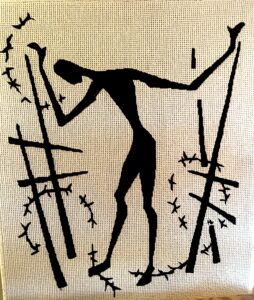 As I follow the daily news from Gaza, I find myself needing to actively resist feelings of anger, helplessness, and despair. I feel pressured to not only understand but justify Israel’s retaliatory and indiscriminate killing and destruction, based on its right to rescue its hostages, punish offenders, and defend its national security, or to justify Hamas’ killing, hostage-taking and escalating war based on historic and current injustices. What does it mean to actively pursue the way of Jesus as a viable alternative? How do we practice the Apostle Paul’s admonition:
As I follow the daily news from Gaza, I find myself needing to actively resist feelings of anger, helplessness, and despair. I feel pressured to not only understand but justify Israel’s retaliatory and indiscriminate killing and destruction, based on its right to rescue its hostages, punish offenders, and defend its national security, or to justify Hamas’ killing, hostage-taking and escalating war based on historic and current injustices. What does it mean to actively pursue the way of Jesus as a viable alternative? How do we practice the Apostle Paul’s admonition:
“Do not be overcome by evil, but overcome evil with good” (Romans 12:21).
I was horrified by Hamas’ attack on October 7. As I’ve traveled through that region and spent three months living on a Kibbutz I was able to envision it. I have deep sympathy for the families of the 1,400 killed, and for the hostages and their families. I recognize Hamas’ strategy of deliberately attracting Israel’s retaliatory violence against its own people, the Palestinians, to turn the Arab world and global public opinion against Israel. And I can also understand but how Israel reacted as they have.
Yet I can understand Palestinian rage as I’ve studied the history, visited and seen from a distance illegal Jewish settlements in the West Bank, witnessed Israeli soldiers firing rubber bullets on Palestinian youth, and heard first-hand accounts of atrocities committed by Israelis against Palestinians.
I am outraged by daily death tolls, and sickened by today’s update on the number of Palestinians killed in Gaza, 9,061– 3,760 of whom are children! Israel’s bombing of a refugee camp, a church, residential apartments, and possibly a hospital, show there is no safe place where human life is respected. The situation is dire and worsening, with ongoing killing, destruction of buildings, infrastructure, and much more death to come.
Lines are being drawn everywhere as people jump to defend Palestinians or Israel. Antisemitism is escalating in Europe and divisions between people are increasing as we all take sides. Sadly, Christians are caught up in the division, right when we have an opportunity to more fully embody and articulate Jesus’ refusal of violence, and alternate way of retaliatory love articulated clearly in Luke 6:27-28.
“But I say to you who hear, love your enemies, do good to those who hate you, bless those who curse you, pray for those who mistreat you.”
Though Jesus lived his life under the brutality of Roman imperial occupation, he never called for or justified retaliatory violence, and neither must we his followers today! Jesus called for and embodied active enemy love (Lk 6:27-36), practicing indiscriminate healing, deliverance and acts of compassion, including Jews and non-Jews alike.
Jesus raised a Jewish synagogue official’s daughter from the dead, healed a Roman centurion’s slave, delivered a Syrophoenician woman’s daughter from evil spirits and drew crowds from Syria and beyond (Mt 4:24-25). He refused retaliatory strikes against hostile Samaritans (Lk 9:55-56), and the use of violence for self-defense against those who came to arrest him (Mt 26:52). Jesus did this from a place of extreme realism regarding human nature, his own distinct mission, and the world around him, telling his followers:
“For nation will rise up against nation, and kingdom against kingdom; there will be earthquakes in various places; there will also be famines. These things are the beginning of birth pangs” (Mk 13:8).
He prophesied that lawlessness would increase as history unfolded, which we are certainly experiencing today. Jesus didn’t speak about the coming turmoil to justify or endorse it. Rather he warned his disciples of the dangers of their love growing cold, a warning we must urgently heed now:
“Because lawlessness is increased, most people’s love will grow cold. But the one who endures to the end, he will be saved” (Mt 24:12-13).
In the face of state violence and oppression, Jesus consistently embodied and openly stated his (and our) priorities:
“This gospel of the kingdom shall be preached in the whole world as a testimony to all the nations, and then the end will come” (Mt 24:14).
For Jesus the kingdom of heaven was not about establishing an earthly kingdom. Nor was Jesus about defending or expanding the State of Israel. Jesus prophesied and lamented the destruction of the temple and Jerusalem, calling his followers to flee to the mountains in the face of an invasion rather than take up arms (Lk 21:20-21). His lament came out of deep love for his Jewish brothers and sisters, who he and the Apostle Paul never gave up on– but never liberated or defended with the use of violence.
Jesus actively lived out his humble, non-violent, retaliatory love to the extreme, allowing himself to be condemned to death by his own people, and brutally executed by the Roman Empire. Jesus died on the cross to forever “break down the walls of division,” “abolishing in his flesh the enmity” (Eph 2:15), “putting to death the hostility” (Eph 2:16), “preaching peace to you who were far away, and peace to those who are near” (Eph 2:17).
Now is the time for followers of Jesus to make a clear and consistent break with normal human reasoning and justifications regarding violence and war. Otherwise, we present the world with a counter-witness to Jesus’ way of saving and announcing the kingdom of God!
In these polarizing times we must be careful to not bear witness from a place of judgment or condescension, but from a humble posture of seeking understanding, and informed solidarity with victims. Jesus leads the way in identifying with the victim by himself becoming a victim. He models extreme intercession, asking his Father to forgive the worst perpetrators of injustice and violence- those torturing and killing God himself!
In these times of war may our intercession and lamentation include Israelis and Palestinians, civilians and soldiers, Hamas and Hezbollah combatants, the Islamic Republic of Iran, and the Israeli Defense Force, children and adults, Muslims, Jews, and Christians. And while we’re at it let us include Russians and Ukrainians, Democrats and Republicans, liberals and conservatives, believers and non-believers, and anyone else who’s on the other side of whatever lines we’ve drawn.
Our intercession will also lead us to denounce injustices, pursue concrete peace-building activities, advocacy for the vulnerable, and other prophetic actions. May these actions be deliberately informed by indiscriminate love that refuses evil and drives away all fear. In this way we will offer the world an alternative that looks more and more like overcoming evil with good, rather than being ourselves overcome by evil.
It is true that “the word of the cross is foolishness”—or looks like it! However please remember it looks that way “to those who are perishing.” In contrast, “to us who are being saved [those actively drawn to Jesus and his way] it is the power of God” (1 Cor 1:18). May we knowingly embrace by faith the fragile-looking realism of the cross as God’s only weapon to defeat evil, and refuse all retaliatory violence.
Check out today’s podcast on this topic, “Engaging in Jesus’ activism in the face of war” on my weekly podcast “Disciple: Word, Spirit, Justice, Witness” via apple or spotify.
Also check out “A Call for Repentance: An Open Letter from Palestinian Christians to Western Church Leaders and Theologians” here.
Spirit-orchestrated Encounters
I’m amazed lately by how the Spirit seems to be orchestrating encounters with people on the streets. The timing of how these meetings happen is inspiring me to be even more attentive, so I can more consciously participate.
Last week I called the jail to see if they’d let me meet one-on-one with a prisoner I know from the streets. The Sheriff’s deputy told me that if I could get down there before 11:30am there would likely be a visitor booth that would be open by then for a short visit– but he couldn’t guarantee it. So, I drove the twenty-minutes to the jail, only to learn that all the booths were still full… but hopefully one would become available.
Just then the big metal door separating the inside of the jail from the outer corridor opened, and a man who was being released walked out, heading past me towards the front doors. I couldn’t see his face because he was wearing a mask, but I noticed his long, dark hair and thought I recognized him from somewhere. I searched my memory as to where I’d seen him, as he kept walking out into the jail parking lot.
I went over and sat down on a wooden bench opposite the attorney booths and read a few psalms. When one of the attorneys walked out, I got up and checked with the deputy to see if a booth was open.
“Not yet,” he said.
I sat down again and after a second attorney left I went again to the deputy, who then told me it was 11:45am and they were telling him there wasn’t enough time for me to visit. I left the jail defeated, and headed to my car, and drove out of the parking lot and headed towards town, pulling over at the jail bus stop to make a quick phone call.
Right after I pulled over, the man who’d passed me leaving the jail approached, and tapped my passenger window. I motioned for him to wait till I’d completed the call, and he nodded that he’d wait.
When I finished the call I lowered my window. Now with his mask off, a visibly Native American man who’d passed me in the jail, asked if I could give him a ride down to the Westside Bridge in town. I welcomed him into my car, and after taking a seat he asked me:
“There in the jail you looked as me like you know me. Do you know me from somewhere?”
“I think I do know you, but I’m not sure from where. Do you know me? I asked.
“No, I don’t know you,” he answered.
I suddenly recalled that I might have seen his face a week before in a traumatic event in downtown Mount Vernon. I had witnessed a group of police officers gathering around some grocery carts filled with the belongings of some unhoused people, who were not visible from the road. Others were wheeling stretchers up towards grocery carts.
Since there have been many recent overdose deaths, and we know many of the people on the street, I decided to park as close as I could get, which was right beside the aid car. I ran up towards the police officers, identifying myself, and then asking them if there were any overdose deaths.
“No, there’s no one dead yet, just two more affected by the bad batch of fentanyl that’s on the streets right now,” an officer told me.
He went on to share that lately they’ve needed 3-6 Narcans to revive people, if they could revive them.
I noticed a visibly Native American woman lying unconscious on the grass. Police officers were checking her vitals. Another man was being wheeled off in a gurney towards the aid car, who I had walked beside, praying for him. I wondered if this is where I had first seen this man who was now in the front seat of my car beside me.
“Did you by any chance have an overdose last week in Mount Vernon near the freeway onramp? Did the police come and take you off to the hospital?” I asked.
“Yes, I did overdose last week right there. After they took me to the hospital they booked me into the jail on some outstanding warrants,” he answered.
“Why do you ask?” he said.
I told him how I’d seen police officers around two unhoused people and I’d run up to see if they were okay. I told him how I’d walked beside him praying for him as the police wheeled him to the ambulance.
“Seriously man! That’s crazy! Thank you!” he said.
“And what’s especially amazing is that right then I was seeing a vision of four eagles circling around me in the sky above– and they were golden eagles!” he specified.
As I drove him to the Westside Bridge in Mount Vernon I asked him if I could pray for him then and there. He gladly agreed, and I prayed for him and his wife and his people on the Swinomish Reservation, giving thanks that they were still alive, and praying for their protection, and that God would give them the desires of the their hearts.
“Are you sure you want me to let you off by the Westside Bridge?” I asked. “Isn’t that pretty close to the trap house across the river?” I asked.
He told me he wasn’t going to straight back to the drugs. I reminded him that since he’s just detoxed from fentanyl, his resistance is low and he’s especially vulnerable to overdosing.
I told him I was heading out towards the Swinomish Reservation as it’s near where I live, and that I could gladly drive him there.
“No, that’s okay,” he said. “I need to find my wife, and if I get all the way out there and then find out she’s here in town, I’ll have to find a ride back here. But thanks for the offer.
I assured him that I and our Tierra Nueva community would hold he and his wife in our prayers.
Pray for the people on the many Native American reservations in our region, who we are increasingly connecting with, and many of whom are attending our faith community– for deep healing, recovery, and spiritual growth.
On further reflection, I am glad now that a visitor booth didn’t open up in the jail, as I would have likely missed this beautiful encounter. I can see that my plans may not be in alignment with the Spirit, and feel freshly inspired by God’s words in Psalm 32:8.
“I will instruct you and teach you in the way which you should go; I will counsel you with my eye upon you.”
Please hold us in your prayers as we seek to minister to vulnerable people on the streets (and in the jail) of our community. May you experience being instructed and counseled by the Spirit, making yourself available to God-inspired encounters as you go about your daily life.
The power of contextual bibliodramas
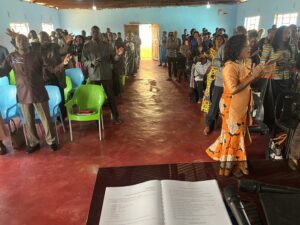 While in Honduras in the 1980s Gracie and I learned to engage illiterate and minimally-educated people in Bible study through spontaneous dramatic re-enactments of Bible stories.
While in Honduras in the 1980s Gracie and I learned to engage illiterate and minimally-educated people in Bible study through spontaneous dramatic re-enactments of Bible stories.
This month during our Certificates in Transformational Ministry at the Margins in Ndola, Zambia and Manenberg, South Africa, I found myself searching for ways to act out Bible stories
During these mostly spontaneous “bibliodramas” the Scriptures came alive afresh in surprising ways, creating bridges that made the ancient text suddenly obviously relevant.
In our CTMM module 2 on “Healing and Holistic Liberation” we treat sensitive topics like father and mother wounds, rejection, abandonment, and trauma, as well as spiritual warfare, healing and spiritual liberation.
When talking about spiritual warfare we use the story of Jesus taking his disciples to the “other side” of the Sea of Galilee, away from his prior ministry among his own people.
I spot a large table that I envision working as a make-shift boat, and ask for help to lay it on the floor. I invite twelve volunteers to serve as Jesus’ 12 disciples, and have them stand on the table like they’ve gotten in a boat. I find someone willing to be Jesus, who joins the disciples in the boat. I invite others to grab jackets or whatever they can wave around the “boat” to demonstrate wind and waves.
I invite someone to read Mark 4:35-37, which describes a fierce gale of wind, waves breaking over and filling the boat. The people with the coats wave them over the the twelve playing the disciples, who pretend to be full of fear. The man playing Jesus is laying down pretending to be asleep.
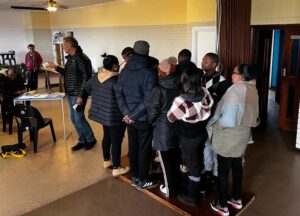 I invite people to consider whether they’ve ran into obstacles when they’ve moved away from their comfort zones to minister in unknown or especially challenging places. People identify easily with this, and give examples from their lives.
I invite people to consider whether they’ve ran into obstacles when they’ve moved away from their comfort zones to minister in unknown or especially challenging places. People identify easily with this, and give examples from their lives.
We read the next verse about Jesus being asleep, the disciples waking him and saying: “Don’t you care that we are perishing?!”
We talk about the feeling of being out there all alone when things get rough. The text gives people permission to identify their feelings of abandonment, their sense that Jesus is doing nothing to help. The disciples model a prayer of complaint that frees us to be real.
As we read what happens next the man playing Jesus gets up, rebukes the wind and sea, saying: “hush, be still!” Those waving jackets stop immediately. Then asks a hard questions to his disciples and us all: “Why are you afraid! Do you still have no faith?”
Those playing the disciples act out the reading of the final verse, pretending to be very afraid and amazed. They say to each other: “Who is this, that even the wind and the waves obey him.”
We end with a discussion about why we are still afraid and lacking in faith, and whether we can imagine stepping into Jesus-like fearlessness and authority.
Simple re-enactments make Scripture visible and more easily imaginable, helping us all see ourselves in the story.
The next study on the Gerasene demoniac in Mark 5 becomes even more interesting now that we know there’s been such opposition even getting to him. In Zambia two pastors from Zimbabwe who came to help teach and minister played Jesus and the demoniac (pictured below).
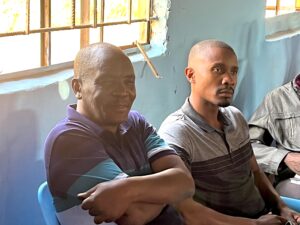 Tawanda (pictured on the right) plays Jesus, stepping off the boat onto the imaginary shore. He’s even himself 32, helping us envision what Jesus might have been like. Richard (left), plays the demoniac with an unclean spirit living in the tombs, who cut himself, cried out night and day, with no one able to subdue him. He runs to Jesus from the side of the meeting place and bows down before him, reading from my Bible:
Tawanda (pictured on the right) plays Jesus, stepping off the boat onto the imaginary shore. He’s even himself 32, helping us envision what Jesus might have been like. Richard (left), plays the demoniac with an unclean spirit living in the tombs, who cut himself, cried out night and day, with no one able to subdue him. He runs to Jesus from the side of the meeting place and bows down before him, reading from my Bible:
“What business do we have with each other, Jesus, Son of the Most High God? I implore you by God, do not torment me!”
I take note for the first time that a human being confessing Jesus as the Son of God is only possible by the Holy Spirit (Mt 16:17)! I invite people to consider that individuals we might consider the hardest cases can have the Spirit actively moving in their lives, revealing Jesus’ identity as God to them.
I ask Richard (the demoniac) why he thinks Jesus is tormenting him. Richard answers “because he thought Jesus would treat him like all the others had, trying to bind him with shackles and chains.”
“Do people outside the church sometimes have bad experiences with people who call themselves Christians, causing them to expect judgment, condemnation, and exclusion?
The people watching are nodding, making comments showing they’re seeing the relevance. I read Mark 5:8 “For he had been saying to him…” and Tawanda, playing Jesus, spoke with a loud voice: “Come out of him you unclean spirit!”
I interview Tawanda about why he says this, and he says “because I can see that there is an evil spirit that is separate from this poor man, tormenting him.”
I continue as the narrator, reading: “And he was asking him,” and Tawanda addressed the demoniac Richard loudly:
“What is your name?”
Richard answers: “My name is Legion, for we are many.”
At this point I explain how “legion” refers to a Roman military unit of 5000 or so soldiers. There was known to be a Roman garrison stationed in that region. The Roman Empire dominated over God’s people Israel and the surrounding nations. This foreign, imperialist power appears to have especially oppressed this man.
Knowing that Ndola is in the heart of what’s called Zambia’s “Copper Belt” I ask what the name of the region’s largest copper mining company?
“Bwana Mukubwa” a few people yell out.
I ask Richard to replace “Legion” with this name in response to Tawanda asking him his name again.
“My name is Bwana Mukubwa!” he yells, and the whole audience breaks out into cries of surprise and laughter.
Suddenly this Scripture seems freshly relevant, as people tell how the mines were once nationalized when Zambia became independent from Britain. But then the IMF and the World Bank pressured the government to sell the mines to private mining companies. Bwana Mukubwa is now owned by Canadian multinational First Quantum Minerals, who take most of the profits out of the country, paying local people mimimal wages.
I explained how the pig herders were likely raising pigs to feed the Roman colonizers. So Jesus’ agreement to send the unclean spirits into the pigs, and their subsequent self-destruction suddenly takes on a new meaning. Jesus’ exorcism frees a tormented individual from evil spirits associated with empire, and destroys those spirits together with the food supply of that empire. And Jesus elevates a marginalized individual over an economy! This is certainly good news to anyone who’s been under colonial domination!
Richard (the once demonized man) then takes a seat, clothed and in his right mind. As others playing the villagers tell Jesus (Tawanda) to get out of their region, Richard asks Tawanda (Jesus) if he can go with him.
At this point as everyone is expecting Jesus to agree to let this newly-liberated person join him as a disciple, Tawanda turns to Richard and and speaks out in a loud voice.
“Go home to your people and report to them what great things the Lord has done for you, and how he had mercy on you.”
At this point Richard begins to walk from one section of the gathering space to another, pretending to share the Good News, as someone reads:
“And he went away and began to proclaim in the Decapolis what great things Jesus had done for him, and everyone was amazed” (Mk 5:20).
In this way we were all able to see how Jesus’ liberating action empowers the most downtrodden people to step into their highest calling as missional agents, even apostles.
That evening after this session we visit a local faith community called Step to Heaven, where we worship together, followed by a time of prayer for people to step into Jesus’ healing ministry.
We witness many experience healing and deliverance, followed by a processional out into the streets of the neighborhood– of foretaste of the Kingdom of God.
We are just 4 days away from the start of our new fall series at The People’s Seminary: CTMM MODULE 1. We will launch this course coinciding with CTMM in Zambia, S Africa, Kenya, and 2 in Uganda).
Certificate in Transformational Ministry at the Margins (CTMM) This training is designed to further equip those already serving (or feeling called to pioneer work) amongst poor, under-reached, and marginalized communities.
It’s not too late to register and scholarships (partial or full) are still available directly on the registration page (drop down menu when you register)
NEW CTMM 2023 Module 1– Online (live) Certificate Program begins Sep 26
Register now: https://www.peoplesseminary.
Visit our website for more information: http://www.
Please email " target="_blank" rel="noopener">communications@tierra-
Bridging the Divide Between the Academy and the Excluded
Throughout our lives Gracie and I have been struck by the enormous divide between the educated, and the poor and excluded– even within the church. A wealth of learning and valuable skills are held beyond the grasp of masses of impoverished people, unless deliberate efforts are made to effectively bridge these separations.
Last November I attended the annual meeting of the Society of Biblical Literature and American Academy of Religion in Denver. Though a Bible scholar by training, I felt out of place among the thousands of scholars– most of them professors in universities or seminaries. Encounters with some of the scholars eased some of my discomfort.
I perused the book tables of all the major theology and biblical studies publishers, checking out new commentaries and books of interest. I made my way to many seminars on specialized topics, listening for new insights on familiar or not-so-familiar texts. I felt like a metal detector, hoping to come upon some buried treasure in the various seminar rooms. I was listening hard for good news, but struggled to hear it, though I barely scratched the surface as there were hundreds of options each day to choose from.
One evening I attended a reception hosted by the Hispanic Theological Initiative, an organization that supports Latinx students and scholars. The ballroom was full of mostly well-dressed people, name badges identifying them and their institutions. Food and deserts were plentiful and wine and beer were in abundance. A woman began speaking from a microphone at the front, warmly welcoming everyone to the reception. It was a festive occasion.
The woman at the front then invited people to give their applause as she showed photos on a big screen of PhD students who had been awarded their degrees, followed by those who had become assistant professors, or moved from assistant professor to associate professor, or associate professor to professor, or become deans or presidents. She invited these people forward, and everyone clapped and cheered. It was a beautiful show of support.
I appreciate their mission statement to: “Increase the recruitment, retention, and graduation rates of Latinx PhD students across the nation by uniting and leveraging institutional resources (human, financial, and infrastructural)… and to “Increase the presence of Latinx leaders and faculty–especially, tenured faculty in seminaries, schools of theology, and universities.” Yet I couldn’t help but also feel overwhelmed with emotion as I found myself struck by the huge contrast between those celebrated and the people I serve here in the Skagit Valley.
I thought of the six or seven Mexican and Chicano inmates I visit in our local jail, most of whom are facing being “retained” by the prison system, and experiencing forced “graduations” from jail to years in prison. They are locked down 22-23 hours per day due to staff shortages. Once in prison they will join the millions of warehoused individuals, who have minimal opportunities for training of any kind in our increasingly cash-strapped and staff-lean mass-incarceration system.
After serving time, many will then be sent off to immigration detention, and they will eventually be deported to their countries of origin. Others will be released, deep in debt, often disconnected from family to the point of being homeless, with labels like “felon” and “ex-con” next to their name, blocking their future.
I thought of the farmworker families attending Tierra Nueva who go from the strawberry and blueberry fields in the summer months to pruning blueberry and raspberry plants and working the tulip fields during the cold winter months– never getting raises or promotions or congratulations.
The gap between what I experienced at the SBL/AAR annual meeting and the people we serve is immense. And the academic language I heard spoken as people read their scholarly papers would be completely unintelligible to most of the people we serve, as well as the world’s population. I lament the growing gap between the masses of men and women in our jails, prisons, homeless encampments, fields and factories– and the small elite of academic theologians and Bible scholars and their students.
As I stood near the back of the ball room considering these things, I suddenly noticed LED flameless candles flickering at the base of what turned out to be a memorial to Latinx theology professionals who had passed away. I approached the memorial and looked at the photos of the faces of person after person who had died, with their birth and death dates. I noticed that many had not lived long lives. Had they died of Covid? Cancer? In a car accident? There were no causes of death mentioned.
As I looked at face after face and read their names I was moved with emotion at all these lives cut short. I thought of my own mortality, and remembered a Scripture I often consider from Psalm 90:12 “So teach us to number our days, That we may present to you a heart of wisdom.”
I think of my own calling to bridge this divide– bringing the best biblical scholarship I can to the poor and excluded. I wonder how I can more effectively reduce this gap in the years of my life that remain.
We want to expand the offering of our Certificate in Transformational Ministry at the Margins to pastors and leaders serving excluded populations all over the world.
For years I have felt called to launch a prisoner pastoral ministry training program, and have since completed a five-volume Guerrilla Bible Studies series that includes 52 tried-and-tested discipleship Bible studies can be used as part of this training.
There, in Denver I met a woman named Sara who has since helped us launch a Certificate in Reading the Bible for Liberation through The People’s Seminary. We now have a distance-learning program in which a number of prisoners are currently enrolled.
I am moved by how Jesus himself shows God’s heart to reach the masses, as he went “around from one city and village to another, proclaiming and preaching the kingdom of God. The twelve were with him” (Lk 8:1).
Jesus was moved with compassion when he saw the crowds, who “were distressed and dispirited like sheep without a shepherd. Then he said to his disciples, “The harvest is plentiful, but the workers are few. Therefore beg the Lord of the harvest to send out workers into his harvest” (Mt 9:36-38).
Recruitment and training of these workers is urgently needed now, and like God who sends his best to the least, may we follow suit in whatever ways we are able.
- « Previous Page
- 1
- 2
- 3
- 4
- 5
- …
- 24
- Next Page »

